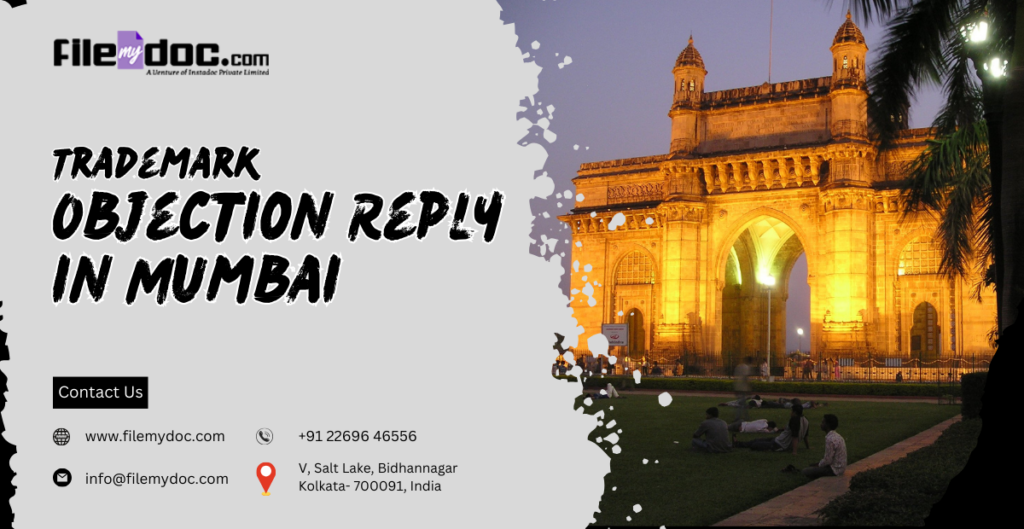Introduction
In Mumbai, protecting your brand with a trademark is crucial. But sometimes, the Trademark Registrar may object to your application. Knowing how to respond effectively can make all the difference. This article will guide you on how to reply to a trademark objection in Mumbai.




What is a Trademark Objection?
A trademark objection is a notice from the Trademark Registrar stating issues with your trademark application. It doesn’t mean rejection, but it needs your response to proceed.
Common Reasons for Trademark Objections
Similarity to Existing Trademarks
If your trademark looks or sounds like an existing one, the Registrar might object to avoid confusion.
Descriptive Nature
Trademarks that describe the product or service too directly might face objections as they lack uniqueness.
Lack of Distinctiveness
If your trademark is too generic, it may not be considered unique enough to register.
The Trademark Objection Process in Mumbai
Filing the Application
You start by filing your trademark application with the Indian Trademark Office, including all necessary details about your brand.
Examination by the Registrar
The Trademark Registrar reviews your application to ensure it meets all legal requirements and checks for conflicts with existing trademarks.
Receiving an Objection Notice
If there are issues, you’ll receive an objection notice outlining the problems that need addressing.
How to Respond to a Trademark Objection
Analyze the Objection Notice
Read the notice carefully to understand the specific issues raised by the Registrar.
Gather Documents and Evidence
Collect any documents or evidence that support your case, such as proof of prior use or market presence.
Draft a Reply
Write a detailed reply addressing each point in the objection notice. Include legal arguments and evidence to back your claims.
Submit the Reply
Submit your reply within the given deadline. Timely submission is crucial to avoid rejection.
Key Elements of an Effective Reply
Address All Objection Points
Make sure your reply covers every point raised by the Registrar. A thorough response shows you’re serious and attentive.
Provide Evidence of Uniqueness
Show how your trademark is unique. Use examples like advertising and market presence to prove its distinctiveness.
Prove No Confusion with Existing Marks
Demonstrate that your trademark is different from existing ones to avoid confusion. Highlight differences in design, wording, and target market.
Get Professional Help
Importance of Legal Expertise
Trademark law is complex. Hiring a trademark attorney can help you craft a strong reply.
Choosing the Right Attorney
Pick an attorney with experience in trademark law in Mumbai. Look for good reviews and recommendations.
Common Mistakes to Avoid
Ignoring Deadlines
Missing the deadline for your reply can lead to automatic rejection. Always keep track of deadlines.
Inadequate Evidence
Provide sufficient evidence to support your reply. Weak evidence can weaken your case.
Poor Reply Structure
A confusing reply can harm your case. Ensure your reply is clear and well-organized.
Tips for a Strong Trademark Application
Conduct Thorough Searches
Before applying, check for existing trademarks that might conflict with yours.
Ensure Uniqueness
Make your trademark unique. Avoid common terms and ensure it stands out.
Classify Goods and Services Correctly
Use the correct classification for your goods and services in your application to avoid objections.
Use Technology
Trademark Databases
Use online trademark databases to check for potential conflicts and strengthen your application.
Online Resources for Replies
Utilize templates and online resources to draft a strong reply.
Conclusion
Responding to a trademark objection in Mumbai requires careful planning and execution. By understanding the process, avoiding common mistakes, and seeking professional help, you can protect your brand successfully.
FAQs
Q.1 What is a trademark objection?
It’s a notice from the Trademark Registrar stating issues with your trademark application.
Q.2 How can I avoid trademark objections?
Do thorough research, ensure your trademark is unique, and follow proper application procedures.
Q.3 What are the costs involved?
Costs vary depending on the complexity of the objection and if you hire a lawyer. Consult an attorney for an estimate.
Q.4 How soon should I respond?
Typically, you should respond within 30 days of receiving the objection notice.
Q.5 Can I reply on my own?
You can, but hiring a lawyer is advisable to ensure a strong reply.




























